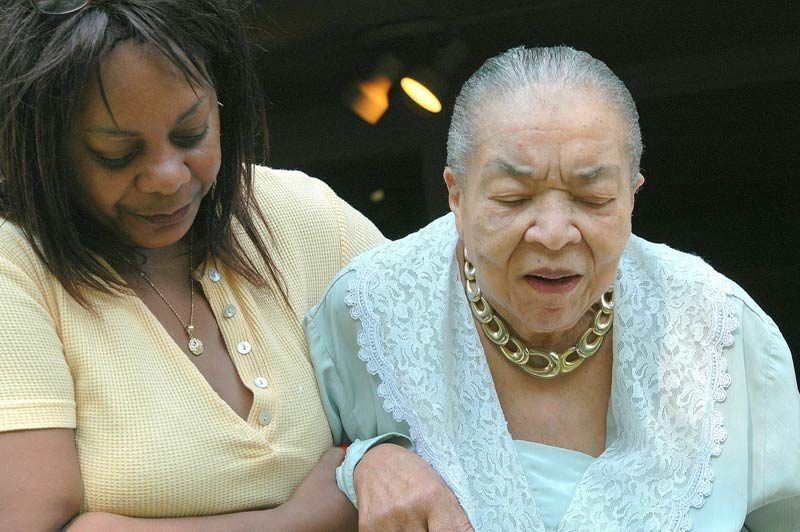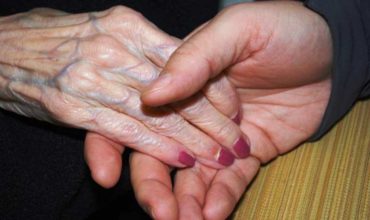How to care for elderly parents is a major concern of many families and adult children, but how to ensure good health care, find the right living situation, and handle legal questions is often complicated for family members that live out of state or abroad. The distance involved makes it harder to get information and help so contingency planning is essential.
Often adult children who live out of town only have short visits during vacation and hate to spend the precious time with their parents talking about serious business or unpleasant possibilities. While it is difficult to discuss the issues of aging, the family who has discussed the options and agreed on plans will be better able to handle whatever happens. It will be worth the time taken, if there is an emergency.
The ideal situation is when the parents take control of their own situations and make decisions in advance of an emergency. They should investigate the types of retirement options and decide which is most appropriate, make informed decisions about life-sustaining medical care, and make sure that documents, instructions, and powers of attorney are available to those who must take responsibility in an emergency. The American Association of Retired Persons recommends that elderly people use a document locator list (see FREE Downloads for the Caregiver Information Guide) to make sure their papers are in order. This list can then be given to the person(s) who will be responsible for them should an emergency arise. Going through the list with your parents should ensure that their wishes are understood.
Communicating with Elderly Parents
Talking with our elderly parents about their living situations and the possible need for change is not always easy. A successful conversation depends to an extent upon the relationship we have with the parent, as well, of course, as on the parent’s mental, emotional and physical condition. While many people put off serious conversations to avoid conflict or awkwardness, both parent and adult child may lose an opportunity for closeness, understanding, access to information that may affect the decision, and optimum peace of mind.
To the extent possible, talk with your elderly parents gently and honestly about their wishes, their abilities and their options. Far more often than not, these conversations are helpful and put the adult child in a better position to make decisions later when the parent may not be able to do so. The following are suggestions for conversations with your elderly parent:
• Share your own feelings, and reassure the parent that you will support them and can be depended upon to help them solve their problems.
• Help the parent to retain whatever control is possible in making his or her own decisions. Respect and try to honor their wishes wherever feasible.
• Encourage the smallest change possible at each step, so that the parent is more able to adjust to the change.
• Educate yourself on legal, financial and medical matters that pertain to your parent as background for your conversations, including current knowledge on the aging process.
• Respect your own needs – be honest with your parents about your time and energy limits.
If this kind of conversation seems impossible or the situation and relationship with the elderly parent become overwhelming, professional counseling may be very helpful.
When a Lifestyle Change May Be Necessary
Physicians and geriatric social workers warn that there are a number of danger signs that indicate an elderly person needs extra help or a change in living arrangement. Any marked change in personality or behavior should be heeded. However, no change in lifestyle should be made without discussions with the elderly person, other family members, and doctors or other health professionals.
Danger Signals
• Sudden weight loss could be an indication that the elderly person is simply not eating or not preparing foods.
• Failure to take medication or over-dosing may indicate confusion, forgetfulness, or a misunderstanding of the doctor’s instructions.
• Burns or injury marks may indicate physical problems involving general weakness, forgetfulness, or a possible misuse of alcohol.
• Deterioration of personal habits such as infrequent bathing and shampooing, not shaving, or not wearing dentures could be the result of either mental or physical problems.
• Increased car accidents can indicate slowed reflexes, poor vision, physical weakness, or general inability to handle a vehicle.
• General forgetfulness such as not paying bills, missing appointments, or consistently forgetting name, address, phone number, and meal times could be a signal.
• Extreme suspiciousness could indicate some thought disorder. Your parents thinking that their neighbors, friends, family, doctor, and lawyer are all conspiring against them would be an example. Intense ungrounded fears about dire consequences may be a danger signal.
• A series of small fires could be caused by dozing off, forgetting to turn off the stove or appliances, or carelessness with matches. They may indicate blackouts or dizzy spells.
• Bizarre behavior of any kind could be a warning sign. This behavior could be dressing in heavy gloves and overcoat in 90 degree weather or going outside without shoes when it’s snowing. Watch for uncharacteristic actions or speech.
• Disorientation of a consistent nature may indicate a need for help. Examples include not knowing who one is, where one is, who the family is, or talking to people who are not there.
Aging in Place
Under this option, the elderly person continues to live in his/her own apartment. Many elderly people live in Naturally Occurring Retirement Communities (NORCs), apartment buildings, condominiums, or cooperatives not designed as retirement communities but where at least 50 percent of the residents are 62 years old or older. These buildings often have amenities such as grocery stores, pharmacies, limousine service, or shopping services.
Recent technological advances often make aging in place easier: Velcro fasteners, lightweight wheelchairs, devices to control appliances and dial telephone numbers. There is even a “walk-in bathtub” for people who have difficulty climbing into an ordinary bathtub. Many services are available to help the elderly person stay in his/her home. Information about them can be obtained from your local Area Agency on Aging.
• Home care services are available in many communities, providing appropriate, supervised personnel to help older persons with either health care (giving medications, changing dressings, catheter care, etc.) or personal care (bathing, dressing, and grooming).
• Meals and transportation are available to older people to help them retain some independence. Group or home-delivered meal programs help ensure an adequate diet. Meals-On-Wheels programs are available in most parts of the United States. A number of communities offer door-to-door transportation services to help older people get to and from medical facilities, community facilities, and other services.
• Adult day care is similar to child day care. The elderly person goes to a community facility daily or 2 or 3 days per week. Activities include exercise programs, singing, guest lectures, and current events discussions. Cost varies and there are often long waiting lists at such centers.
• Respite care brings a trained person into the home to give the full-time caregiver time off to get a haircut, visit the dentist, or take a vacation. Service is generally offered through area Departments of Social Services and is based on a sliding fee scale.
Other Housing Options
There are several types of retirement communities that provide living arrangements and services to meet the needs of both independent seniors and those who need assistance. Large hotel corporations are in this field and other facilities are set up for members of a certain organization (retired military, Elks, etc.). It is important when investigating these housing options to understand completely the services provided and the cost.
• Adult congregate communities are designed for the fully able-bodied, 55 and older. Residents buy co-ops or condominiums and pay a monthly fee for grass mowing, leaf raking, and snow shoveling. A pay-as-you-go medical center is on site and a nurse is on duty 24 hours a day to make home visits in emergencies. Leisure World is the most famous example of an adult congregate community.
• Assisted living communities are rental retirement communities for independent seniors who need some assistance. A homelike atmosphere, three meals a day, maid, linen, and laundry service, availability of a registered nurse, and many personal care services are provided in the all-inclusive rent.
• Rental retirement communities with fee-for-service nursing units charge residents an entrance fee plus a substantial monthly rent. When the need for nursing care arises, residents pay an extra daily fee and stay in a nursing unit, usually located on site or nearby.
• Life care or continuing care communities provide a continuum of care from independent living to nursing home care on the premises. The individual must be independent when s/he enters the community. These communities require a substantial entrance fee and monthly service fee. Residents get one meal a day in a dining room, maid service, linen service, maintenance, transportation to shopping and cultural events, travel planning, and a pull cord to an emergency nurse. If nursing care is needed, it is provided at no extra cost.
• Personal care homes (board and care) are licensed in many communities to provide shelter, supervision, meals, and personal care to a small number of residents.
• Subsidized housing for the elderly is an option for the elderly poor in reasonably good health. Subsidized by Department of Housing and Urban Development, income limits apply. No round-the-clock care is provided but nurses come in to check blood pressure and assess a resident’s functioning. Residents take meals in a dining room and may have use of a library, recreation area, or beauty shop.
Nursing Facilities
If the elderly person is not capable of independent living, a nursing home may be the appropriate option. Nursing homes offer two levels of care – skilled nursing and intermediate care – depending on the patient’s needs. Most nursing homes offer both levels of care on a single site.
• Skilled nursing facilities provide 24-hour nursing services for people who have serious health care needs but do not require the intense level of care provided in a hospital. Rehabilitation services may also be provided.
• Intermediate care facilities provide less extensive health care than skilled nursing facilities. Nursing and rehabilitation services are provided but not on a 24-hour basis. These facilities are for people who cannot live alone but need a minimum of medical assistance and help with personal and/or social care.
Paying for Long-Term Care
It is important to understand the different types of insurance that are available to older people. Many people believe that Medicare will cover long-term care needs. It will not.
Medicare
Medicare is a Federal health insurance program which helps defray many of the medical expenses of most Americans over the age of 65. Medicare has two parts:
(Part A) Hospital Insurance helps pay the cost of inpatient hospital care. The number of days in the hospital paid for by Medicare is governed by a system based upon patient diagnosis and medical necessity for hospital care. Once it is no longer medically necessary for the person to remain in the hospital, the physician will begin the discharge process. If the person or the family disagrees with this decision, they may appeal to the state’s Peer Review Organization.
Medicare does not pay for custodial care or nursing home care. It will, however, cover up to 60 days in a nursing home as part of convalescence after hospitalization.
(Part B) Medical Insurance pays for many medically necessary doctors’ services, outpatient services, and some other medical services. Enrollees pay a monthly premium.
Medicaid
Medicaid is a joint federal-state health care program for people with a low income. The program is administered by each state and the type of services covered differs. There are strict income requirements so it is necessary for the person to “spend down” all income and assets to poverty levels before becoming eligible. Medicaid is the major payer of nursing home care.
The Medicaid requirement to “spend down” all income and assets created a great hardship for the spouse of a person needing nursing home care. Changes in the Medicaid rules now allow the spouse to keep a monthly income and some assets, including the primary residence. The amounts allowed change, so you must check for current levels.
Other Insurance
Why buy other insurance? The purchase of additional insurance gives the policy holder access to a greater choice of facilities without dipping into additional financial resources. Medigap is the name given to privately-purchased supplemental health insurance. It is designed to help cover some of the gaps in Medicare coverage but does not cover long-term care. Study Medigap policies carefully to be sure they provide the protection needed and do not duplicate other health insurance.
Long-Term Care Insurance is a private insurance that is usually either an indemnity policy or part of an individual life insurance policy. An indemnity policy pays a set amount per day for nursing home or home health care. Under the life insurance policy, a certain percentage of the death benefit is paid for each month the policyholder requires long-term care. Policies are priced differently depending on the age of the policyholder, the deductible periods chosen, and indemnity value or duration of benefits.
Related items
How to Take Care of Yourself While Taking Care of a Loved One?
Remember: your needs are important too! Caring for a loved one is an emotional task and ca
3 Important Questions to Ask If You Are Retiring
From the day we get our first big-time job we’re looking towards finally retiring as a sen






